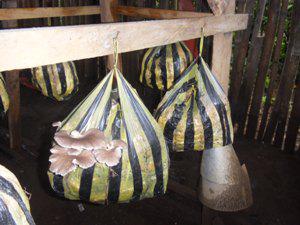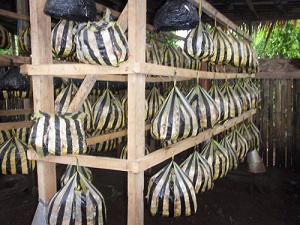Rosemary Tonjock
Other projects
7 May 2010
Conservation and Ethnomycological Studies of Macro-Fungi (Mushrooms) in the Mount Cameroon Region
The project is aimed at establishing a genebank of macrofungi of conservation importance and to carryout cultivation trials in the Mount Cameroon Region.
The Kingdom fungi are less researched and neglected group of organisms compared to plants. Mushrooms serve as a source of food, beverages, they supply us with pharmaceuticals, traditional medicine, modern medicine, biochemicals and enzymes of enormous value to medicine and industry helps in nutrient cycling through mycorrhiza associations, as decomposers, biocontrol agents, and as agents for remediating sites polluted with intractable wastes amongst other vital uses.

Cultivation.
However, conservation of mushrooms in the Mount Cameroon Region is limited and not well promoted. Mycodiversity in the Mount Cameroon region is day by day threatened by natural and anthropogenic factors which contribute to the drastic reduction of fungi species. These includes over harvesting and habitat destruction amongst others. Hence, there is the need to conserve the genetic resources through culture collection and cultivation.

Pleurotus.
The project will be achieved through field collections of indigenous mushrooms species of conservation importance, their identification, cryo-preservation, market surveys and cultivation trails. This will involve field surveys, microscopy, culturing, studies on growth conditions with locally available cheap substrates and other aspects related to the eventual commercialization of these indigenous species. Basidiocarps of indigenous fungal species will be collected from the Mount Cameroon Region.
Identification of the different species will be done by comparative morphology. Culture will be prepared using different growth media (PDA and ME) to select the best. Maintenance of cultures will be done in a refrigerator. Cultivation trials will be carryout using different locally available substrates (sawdust, empty palm fruit bunch, leguminous trees and bagasse) to select the best suited for a particular mushroom. Also, the different substrate concentrations and ratios will be investigated.
Source of reliable and stable mother cultures for the preparation of spawn to be used in local cultivation of mushrooms will be develop. This will go a long way for the cultivation of mushroom with the local community hence limiting over harvesting of these particular mushrooms in the forest. This will lead to the development of local mushroom cultivation industries that will generate jobs and income and supply high protein vegetative food. In addition to that indigenous mushroom species will be conserved. Publications will emanate from this project which will be made available to the local communities, Rufford Foundation and to the scientific world.